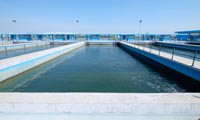

Garside Sands has supplied more than 2,400 tonnes of its Slowfil Sand to Thames Water, as part of an ongoing programme to improve its water quality for customers across London and the Thames Valley.
Thames Water is the UK’s largest water and wastewater provider, serving 15 million customers, and purifies its drinking water using the age-old method of slow sand filtering from its five operational Thames Water sites.
Garside Sands, part of leading construction materials supplier Aggregate Industries, supplied the sand following a successful trial last year in conjunction with Western Carbons, anthracite filter media specialist. The product meets the acute industry standard for size, grading and colour required for the production of safe drinking water.
The process of slow sand filtering takes place in a sand-filled container, in which the sand is initially submerged in water. This water allows the top layer of wet sand to gradually develop a biological ‘film’ made up of living organisms such as algae and bacteria. Once this has occurred the water filtration process can begin.
The surface biofilm (top layer) is the layer that provides the most effective purification as the living organisms essentially ‘eat’ or attach to pathogens in the water, effectively stopping them from flowing down through the sand. As water travels down, due to the natural pull of gravity, the underlying sand continues to provide a level of biological treatment, which lessens as the water reaches the bottom most layer of sand.
Doug Cook of Western Carbons, who installed the filtration media for the specification, said: “Having a highly accurate specification of sand plays a crucial role in ensuring that our water filtration process is safe. Garside Sands worked closely with us to understand what it was that we needed and, following a successful trial last October, they were able to provide us with a finely graded sand which offered the right level of permeability to manage the removal of microorganisms. We are delighted with the results so far.”
Clive Martin, commercial manager at Garside Sands, said: “Slow sand filtering was a method adopted back in Victorian-times and, despite the revolution in technology, is still considered one of the most effective forms of water purification today and used widely throughout the world - all while being incredibly cost effective and environmentally friendly.
“If the sand is of high quality, we know that these filters can produce water that has a 90-99% bacterial cell count reduction. As such, we ensured that we spent the right amount of time in developing a sand that would help to both enhance and maintain the quality of water that Thames Water’s slow sand filters can continue to produce for years to come.”
Aggregate Industries is a leading supplier of specialist silica sand, with quarries in Leighton Buzzard and Levenseat. Aggregate Industries’ Garside Sands range is renowned for its high silica content (typically over 90 per cent), grain shape and naturally occurring colour range. It’s exported all over the world for applications including water filtration, brick manufacture, energy processing and sports pitches.